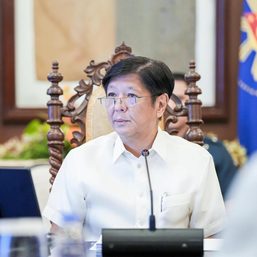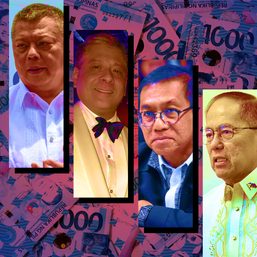SUMMARY
This is AI generated summarization, which may have errors. For context, always refer to the full article.
![[In This Economy] Amid rising deficits, abuse of confidential funds downright immoral](https://www.rappler.com/tachyon/2023/10/TL-confidential-funds-immoral-oct-16-2023.jpg)
Every peso counts more than ever, what with the government’s ballooning deficits and debt.
In 2022, as I noted in a previous piece, the government’s deficit or revenue shortfall was P1.6 trillion. This means that the government’s expenses exceeded its revenues by P1.6 trillion. That amount was more than twice the pre-pandemic level.
All that had to be borrowed and added to the national debt which, as of August 2023, amounted to a whopping P14.35 trillion. That’s more than 65% of the national income in 2022.
There’s no let-up. Outstanding debt is forecasted to rise further to P14.62 trillion by end-2023, and to a dizzying P15.84 trillion by end-2024.
Meanwhile, according to Marikina Representative Stella Quimbo, about 43% or nearly half of the P5.7-trillion 2024 budget will have to be borrowed. This translates to P2.46 trillion in extra debt.
This, coupled with accelerating prices, may be the reason there’s a microscope trained on how the Marcos administration plans to spend money next year, as found in the proposed 2024 budget.
Of course, there’s any number of objectionable budget items every year. But the one that has gotten the most scrutiny of late are confidential and intelligence funds.
For 2024, Marcos originally proposed P10.14 billion in confidential and intelligence funds, of which 44% will go to just the Office of the President (OP).
Sure, P10.14 billion is not that big in the grand scheme of things. That’s less than one-fifth of 1% of the total budget next year. Puny.
But that’s not the point, and that fact alone doesn’t make the confidential funds any more justifiable.
Opportunity cost
There’s a very useful concept in economics called “opportunity cost.”
In a world of scarce resources and trade-offs, the value of anything is really what you give up to get it. For instance, if you’re spending an extra hour of leisure, the value of your hourly wage – the income you’re foregoing – may be the opportunity cost of your leisure.
The same concept applies to the national budget, which has a fixed ceiling set by the executive. For next year, that cap is P5.7 trillion, and Congress can’t increase or decrease that.
Given that fixed cap, how will we spend public funds next year? If we spend P10.14 billion on confidential and intelligence funds, which alternative programs and policies are we not funding instead?
Take for instance the P150 million in confidential funds that Vice President and Education Secretary Sara Duterte is asking for the Department of Education (DepEd). Rappler did a piece showing that such an amount can fund any number of things: the annual salaries of 462 new teachers, 4.5 million textbooks, 250,000 school uniforms, 4,286 laptops, or 57 classrooms.
Meanwhile, Duterte is asking for even larger confidential funds for the Office of the Vice President (OVP): P500 million. But strong public backlash in a span of several weeks pressured the House of Representatives to divert P1.23 billion in confidential funds away from not just the OVP, but also the DepEd and some other agencies.
Those funds will now be diverted toward more deserving agencies – those with legitimate intelligence information gathering and surveillance operations – such as the National Intelligence Coordinating Agency, National Security Council, and the Philippine Coast Guard.
The challenge, though, is that confidential funds can go back to the OVP and DepEd in the Senate or in the bicameral conference committee. In other words, we must remain vigilant. ’Di pa tapos ang boksing.
Don’t normalize this
The bigger issue is that we should work to prevent, if not reverse, the abuse of confidential and intelligence funds, which ballooned starting the term of former president Rodrigo Duterte. He’s the one the blame, really.
Figure 1 shows that the OP’s confidential and intelligence funds increased by fivefold from 2016 (the last budget of the late Benigno Aquino III) to 2017 (Duterte’s first budget). And such allocations in the OP have only grown since.
Figure 1.
It’s not just that. There was also a discrete jump in total government confidential and intelligence funds in 2017, and there has been a steady uptrend since then (Figure 2).
Figure 2.
Duterte’s daughter, Sara, is now continuing and contributing to that “legacy” of her father. But it’s arguably worse. From absolutely zero in 2022, confidential funds in the OVP exploded to P500 million in 2023 (Figure 3). And it might be repeated next year if lawmakers work their magic in the Senate or the bicameral conference committee. The allocation of confidential funds in the DepEd is also unprecedented.
Figure 3.
What’s more, Sara’s confidential funds also blew up during her terms as Davao City mayor, according to a Rappler report. From just P144 million in 2016 (already a large amount then), it increased to P294 million in 2017 (Sara’s first term). It further rose to P460 million in 2019, and stayed there until 2022.
If you crunch the numbers, Davao City had a mind-boggling P2.69 billion in confidential funds from 2016 to 2022 – certainly larger than even the largest and richest cities in the country, as shown by data culled by my UPSE friend and colleague Cielo Magno.
The fact is, the Duterte clan has gotten used to (and conveniently gotten away with) confidential funds at the local level, and they’ve been scaling up their access to it since they landed on national positions. They’ve “normalized” its use and abuse, and Marcos is merely benefitting from that trend.
We ordinary Filipinos can and must stop the abuse of needless confidential and intelligence funds. We can do this by training ourselves to scrutinize the government’s budget year in, year out.
I know it’s exhausting. But as shown by recent events, politicians can feel the heat. We just need to stoke the fires of accountability to begin with. – Rappler.com
JC Punongbayan, PhD is an assistant professor at the UP School of Economics and the author of False Nostalgia: The Marcos “Golden Age” Myths and How to Debunk Them. JC’s views are independent of his affiliations. Follow him on Twitter (@jcpunongbayan) and Usapang Econ Podcast.
1 comment
How does this make you feel?







![[Free to Disagree] De Lima stood firm. But some men are trash.](https://www.rappler.com/tachyon/2024/07/TL-Leila-de-lima-stood-firm-some-men-brave-some-trash-July-1-2024.jpg?resize=257%2C257&crop_strategy=attention)
![[EDITORIAL] Ang ‘deep, deadly web’ ng POGOs](https://www.rappler.com/tachyon/2024/07/animated-pogos-chinese-crime-syndicate-carousel.jpg?resize=257%2C257&crop=280px%2C0px%2C720px%2C720px)
![[OPINION] Power of mimicry: How human rights are covertly undermined in PH](https://www.rappler.com/tachyon/2024/06/duterte-marcos-human-rights.jpg?resize=257%2C257&crop_strategy=attention)

![[Rappler’s Best] Fasten seatbelt, Mr. President](https://www.rappler.com/tachyon/2024/07/fasten-seatbelt-mr-president-edit.jpg?resize=257%2C257&crop=235px%2C0px%2C720px%2C720px)


![[Closer Look] ‘Join Marcos, avert Duterte’ and the danger of expediency](https://www.rappler.com/tachyon/2024/06/TL-trillanes-duterte-expediency-june-29-2024.jpg?resize=257%2C257&crop_strategy=attention)
Thanks again to Prof. JC Punongbayan for his educational article, “Amid rising deficits, abuse of confidential funds downright immoral.” He presented the concept of “opportunity cost” and applied it to the recent issue of confidential funds. Accordingly, confidential funds could have been used to fund “alternative programs and policies” that really and clearly benefit the Filipino People. Instead, “the Duterte clan has gotten used to (and conveniently gotten away with) confidential funds at the local level, and they’ve been scaling up their access to it since they landed on national positions. They’ve ‘normalized’ its use and abuse, and Marcos is merely benefitting from that trend.” Perhaps, our Political Dynasties have a different concept in mind: “opportunistic cost.” This means the loss of opportunity to use public funds for corrupt purposes. This is the concept that is foremost in their minds.